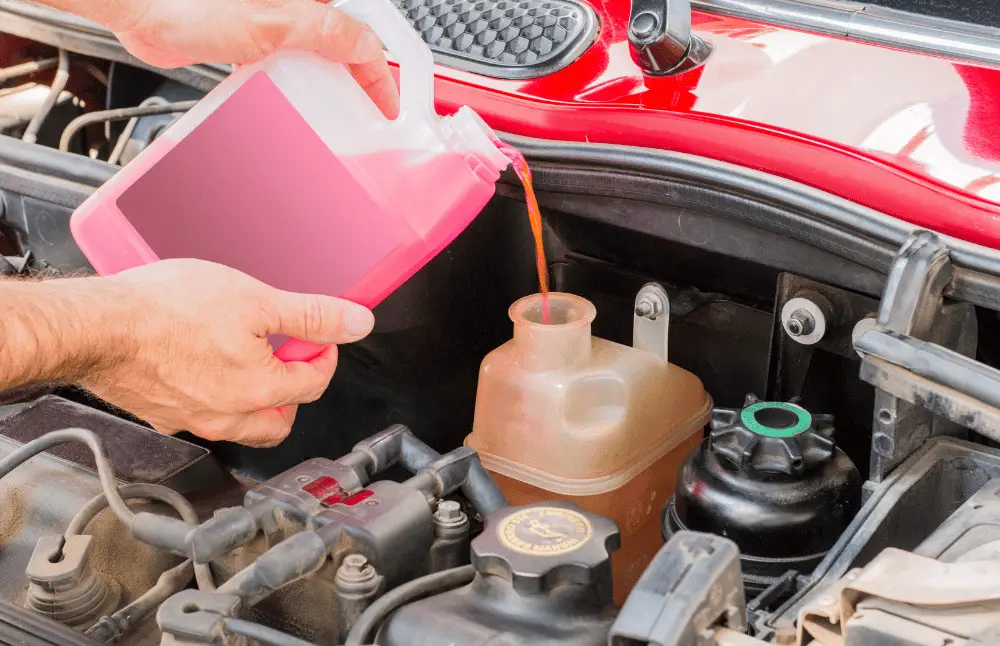
Today we’re discussing a common question among automotive enthusiasts: is G40 coolant the same as G13? This is an important question to know the answer to, as the wrong type of coolant can irreparably damage your vehicle. Let’s look at G40 and G13 coolants and how they compare.
Table of Contents
Is G40 Coolant The Same As G13?
G40 and G13 coolants are not the same. G40 is a pink-colored, long-life, ethylene glycol-based coolant that meets VW TL 774-G specification and provides extended protection against corrosion, cavitation, and freezing.
On the other hand, G13 coolant is a newer type of red-colored, long-life, ethylene glycol-based coolant that meets VW TL 774-J specification and is designed to provide superior protection against corrosion, cavitation, and overheating.
Using the correct coolant for your vehicle is important, as using the wrong type can cause damage. Mixing G40 and G13 coolants should be avoided. Both are used in Audi and VW. However, they aren’t the same despite being similar.
What is G40 and G13 Coolant?
G40 and G13 coolants are both types of antifreeze. They are composed of ethylene glycol or propylene glycol, which keeps liquid in the radiator from freezing in cold temperatures. Both types also contain corrosion inhibitors which help to protect the parts from rusting or corroding in extreme conditions.
Differences Between G40 and G13 Coolant
The biggest difference between these two types of coolants is that G40 contains composition modifiers for increased performance in certain cooling systems, while this is not found in G13 coolant. These composition modifiers consist of alkalinity buffers, lubrication agents, and other ingredients for increased protection for different kinds of engines.
Which Type Should I Use For My Vehicle?
Choosing which type to use depends on your vehicle’s cooling system. If you have a newer engine that uses oil-based technologies like direct injection or turbocharging, then you should use a specialized coolant like the pre-mixed version of the G40 instead of just plain water.
On the other hand, if you have an older engine with no advanced features, then plain water or pre-mixed versions of either would do just fine.
Benefits Of Using Pre-Mixed Coolants
Most pre-mixed versions come with additional benefits, such as better heat transfer efficiency, improved system cleaning properties, enhanced protection against boilovers, extended life span, and more efficient operation at lower engine temperatures. By using pre-mixed coolants instead of mixing your own concoction, you’ll also be sure that all safety factors have been accounted for without having to worry about whether or not it’s compatible with your system.
Advantages And Disadvantages Of Using Either Type Of Coolant
There are advantages and disadvantages to using each type, depending on your situation – here’s a quick rundown:
Advantages Of G40: Increased performance for certain cooling systems; Contains composition modifiers; Specialised protection for different kinds of engines; Pre-mixed comes with additional benefits
Disadvantages Of G40: Not suitable for older engines; Requires more frequent flushing/replacement interval
Advantages Of G13: Suitable for most engines; No need to flush regularly; No extra additives
Disadvantages Of G13: Not suitable for newer engines; No extra protection against corrosion etc.; May need a higher concentration ratio
Conclusion
So there you have it – now you know what both types of antifreeze are and understand their differences. Ultimately it is up to you to decide which one best suits your needs – if you think that an added layer of protection would benefit your vehicle, then go ahead and get yourself some pre-mixed g40.





